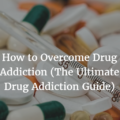What is drug addiction?
Addiction is defined as a chronic, relapsing disorder characterized by compulsive drug seeking, continued use despite harmful consequences, and long-lasting changes in the brain. It is considered both a complex brain disorder and a mental illness. Addiction is the most severe form of a full spectrum of substance use disorders, and is a medical illness caused by repeated misuse of a substance or substances.
Use of and addiction to alcohol, nicotine, and illicit drugs cost the US more than $740 billion a year related to healthcare, crime, and lost productivity. In 2016, drug overdoses killed over 63,000 people in America, while 88,000 died from excessive alcohol use. Tobacco is linked to an estimated 480,000 deaths per year.
How do drugs work in the brain to produce pleasure?
Nearly all addictive drugs directly or indirectly target the brain’s reward system by flooding the circuit with dopamine. Dopamine is a neurotransmitter present in regions of the brain that regulate movement, emotion, cognition, motivation, and reinforcement of rewarding behaviors. When activated at normal levels, this system rewards our natural behaviors. Overstimulating the system with drugs, however, produces effects which strongly reinforce the behavior of drug use, teaching the person to repeat it.
Is drug use or misuse a voluntary behavior?
The initial decision to take drugs is generally voluntary. However, with continued use, a person’s ability to exert self-control can become seriously impaired. Brain imaging studies from people addicted to drugs show physical changes in areas of the brain that are critical for judgment, decision-making, learning, memory, and behavior control. Scientists believe that these changes alter the way the brain works and may help explain the compulsive and destructive behaviors of a person who becomes addicted.
How To Help Someone With Drug Addiction
Helping someone with drug addiction is difficult but a necessary undertaking in order to restore a healthier lifestyle. A struggle with addiction and mental health disorder affects more than just the individual who is diagnosed. Friends and family members may feel continually stressed, guilty, or helpless while watching a loved one grow more distant and distressed. There may also be feelings of anger or frustration that this person will not change the negative behaviors, and there may be a temptation to avoid the loved one entirely.
Help for you as a carer: caring for a partner, family member or friend who has a drug abuse problem can leave you feeling isolated and alone. It may be hard to talk to others about your situation, particularly if they haven’t had the same experience as you.
There are local and national organizations that support the families and carers of people who use drugs. Many carers find it helpful to talk to others in the same situation, perhaps at a local carers’ support group.
Alternatively, online forums can provide an opportunity to share your experiences. You can find information, contacts or counselling services by going to the Department of Health’s Drug Help website.
Help for the person you care for: help is available for people with a drug problem. However, it’s important to realise that your friend or family member will only seek help when they’re ready.
The main way to access these services and support is by talking to a doctor. Alternatively, the person you care for can contact their nearest drug addiction service.
How you can help them
Even when they know they have a drug problem, it can be difficult for people to change. You may need to be patient. If the person isn’t ready to seek help, you can still support them by trying to minimize the impact that their drug use has on them and others around them.
If you are concerned about a friend or family member’s drug use, it is important to reach out to a professional and get some advice on how to approach the issue with them.
You may be able to help by letting them know about the support that’s available to them. If they choose to seek help for their drug use, you can support them by being understanding about how they’re feeling, while encouraging them in the changes they’ve chosen to make.
For many people, taking action to deal with their drug use is just the start, and maintaining the changes they’ve made may be the most difficult part. Recognizing situations that could trigger their drug use, and trying to avoid these, could help. If the person you care for does lapse back into drug use, you can encourage them to seek help, for example by keeping in contact with local support services.
If the person you care for continues to use drugs despite the support you provide, this can be very frustrating and demoralizing. Remember, the decision to use drugs is their responsibility, not yours, and make sure you seek help for yourself as a carer.
How to talk to someone about their drug abuse
Starting a conversation with someone about their drug addiction is never easy, but it’s important you come from a place of compassion and understanding. Remember, no one sets out to become an addict. Drug abuse is often a misguided attempt to cope with painful issues or mental health problems. Stress tends to fuel addictive behavior, so criticizing, demeaning, or shaming them will only push your loved one away and may even encourage them to seek further comfort in substance abuse.
Discovering someone you love has a drug problem can generate feelings of shock, fear, and anger, especially if it’s your child or teen who’s using. These strong emotions can make communicating with a drug user even more challenging. So, it’s important to choose a time when you’re both calm, sober, and free of distractions to talk. Offer your help and support without being judgmental.
Don’t delay. You don’t have to wait for your loved one to hit rock bottom—to get arrested, lose their job, suffer a medical emergency, or publicly humiliate themselves before you speak out. The earlier an addiction is treated, the better.
Express your concerns honestly. Emphasize that you care for the person and are worried about their well-being. Offer specific examples of your loved one’s drug-related behavior that have made you concerned and be honest about your own feelings.
Listen. Even when you don’t agree with the person, take the time to listen to what they have to say without trying to argue or contradict them. The more your loved one feels heard, the more they’ll see you as supportive, someone they can confide in.
Offer them information about how they can address their drug problem—whether that’s calling a helpline, talking to a doctor or counselor, entering a treatment program, or going to a group meeting such as SMART Recovery, or a 12-step program like Narcotics Anonymous (NA).
Be prepared for denial. Your loved one may become defensive or angry and refuse to discuss their drug use. Many people feel a sense of shame when confronted by their behavior and will try to deny they have a problem. Don’t argue with them, just revisit the issue another time.
Avoid trying to lecture, threaten, bribe, or punish the person. Getting angry or making emotional appeals will likely only add to the user’s feelings of guilt and reinforce their compulsion to use.
Don’t expect a single conversation to fix the problem. This will likely be the first of many conversations you’ll need to have regarding your loved one’s drug use. There’s no quick fix to overcoming addiction. It may take several conversations for them to even acknowledge they have a problem, the first step on the road to recovery.





